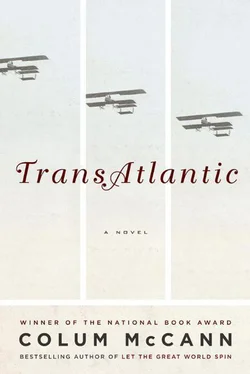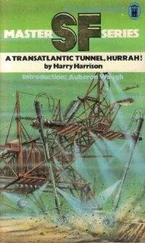Lily cleaned the wound with hard soap and a basin of cold water. She dressed it like she would have for the living, and then dragged his body across the grass.
NO MOON. A great darkness. The hoofclop of the horses. Jon Ehrlich descended the wagon in a narrowbrim hat and boots. She waited for him as always on the lower stairs. When she saw him approach she lit the lamp. The weather was beginning to turn, the hint of a snap in the air.
— Lily, he said, tipping his hat.
She turned to help him take the first crate from the wagon. She pushed the crate forward and steadied it against his back. He locked his knees and shouldered the burden. Bent into the familiar pose. She walked in front of him, into the basement, the light pooling, a swinging semicircle through the old glass factory. Some rats scurried in the corner, slinking past sheets of glass. Lily halted in front of the ice-room door. She turned her face away.
When he yanked on the cold metal handle and pushed open the door, he saw the boy laid out full-length on the remaining cubes. His uniform neat and washed and mended, his shoelaces tied, the harp badge on his chest. His hair washed and combed.
— Lord, said Jon Ehrlich.
He placed the block on the floor, touched his palm against the book in his jacket pocket. Lily let out the sound of an animal: something cut, arrowed, gutted. She came towards him with her head bent savagely low. He sidestepped her. She turned. She drew her arm back and she thumped him on the chest, powerfully, a push of grief. Jon Ehrlich stepped backwards. A shot of breath moved through him. He planted his feet. Didn’t move. She punched him once more. The full force of her fist. She cried out and kept on punching until she was exhausted against him, her head against his shoulder.
Later, almost morning, they buried Thaddeus two hundred yards from the hospital. A chaplain came. There was a drunkenness to his prayers. Some men had gathered at the hospital windows to look down upon them. A faint reef of light climbed up over the east.
She knew she was going with Jon Ehrlich. He didn’t even question her when she sat up on the wagon and straightened out the folds in her dress. She looked straight ahead. She could hear the soft rip of grass in the mouths of the horses: the way it moved and crushed.
LILY ACCOMPANIED JON Ehrlich to his home north of the Grand River. She was baptized into the Protestant faith: it didn’t seem too different from what she had already chosen not to believe in. Not since Dublin had she been in any manner of church. Even then it had only been through obligation. She sat in the second pew from the front. She was given a Bible and a commemorative piece of lace. The service was short and brusque, some words in Norwegian, most in English. The preacher asked if there was anybody present who was ready to renounce evil and accept the Lord as his or her divine savior. Jon Ehrlich tapped her on the elbow. Yes, she said, and went to the front of the church. Bowed her head. Waited. One or two scattered hallelujahs rose around the church. She was taken out the back door, towards a small trout stream, where the congregation gathered. A song erupted from them. Take me from this darkened valley, wreath me in sheaves of peace . She was carried through the reeds into the shallows of the river. A heron took off in the air, flapped wildly across the water, its wingtips touching the surface, rippling it. The pastor told her to hold her nose. He put his hand at the small of her back. When she was dunked, she felt little but the chill.
She had no real idea what it meant to be Protestant, it was an absence to her, although she remembered so clearly the Quaker meetings she had seen in the house in Great Brunswick Street, with Webb at the front of the room, hands interlocked, his long rambling ideas on fate, peace, brotherhood. She had not told Jon Ehrlich of those days. She feared, if she did, he might grow silent around her. He was a good soul. He deserved no jealousy. The old life in Ireland was distant to her now: she needed it no more, she had stepped away.
After the baptism she was married immediately and was taken to the cabin by the lake. Lily Ehrlich. She descended the wagon onto the hard dust and looked around.
— I live by small means, he said.
It was a flat land. A quiet lake. Other small lakes stretching into the distance. A series of wooden storage sheds were clumped together near the road. Mosquitoes swirled in great swarms. The horses swished their impatient manes.
— I best get you inside, he said.
He had a clear, still smile. She pulled her dress tight as a bud, curtsied in front of him.
— Get you flat down.
— About time, she said.
It was the first she had laughed in quite a while.
He swung open the cabin door for her. Silver flecks of dust stuttered the sunlight. A bed in the corner made with pine pole and frapped twine. He watched while she undressed before him, then he dropped his boots, unsnapped his braces, and his clothes pooled around him on the floor.
For an older man, she thought him sprightly and enthusiastic. They lay together, panting, her face against his shoulder. She woke him when the darkness was still on the sky. He turned towards her and grinned.
— Even the Good Book says it’s no harm.
LILY WAS THIRTY-SEVEN years old when she had her first of six Ehrlich children: Adam, Benjamin, Lawrence, Nathaniel, Tomas, and their only girl, Emily, the youngest, in 1872, seven years after the end of the war.
AS SOON AS the cold came, the lake began to freeze. Jon Ehrlich rose and dressed in the faint warmth from the stove and went quietly out from the cabin and tested it every day. When the ice was four inches deep it was capable of holding a man. He walked from one side of the lake to the other, staying close to the shore at first. Lily watched him diminish in the distance, tall and thin, the limp growing smaller.
A fierce wind blew across the bankside snow, kicked small eddies into the air. The trees made a dark run into the flat distance. He brought his oldest sons out to join him.
Father and sons turned and turned, testing the strength of the ice. Falconing, he called it. They circled closer to the center of the lake. Each time they reached the end of a spiral, Jon Ehrlich raised his boot and stamped to check the thickness. Lily watched the two older boys, Adam and Benjamin, do the same thing. The clean thud of their boots broke the silence. She thought they might disappear under at any time, that the lake would take them and ice over, swallow their scarves, their hats, their face wrappings. But they circled inwards, meticulous in their patterns. They knew the depth of the ice by the sound of their boots.
They went out the next morning to begin sinking the lake. Jon Ehrlich used a long thin auger to bore the holes. Steel with a sharp point. When he turned the handle, it looked to Lily as though he were churning butter. Small sparks of ice rose from the surface. He went across the lake with the boys, sinking hole after hole in the ice, three feet apart. They made a checkerboard of the lake. They stood over each hole and inserted a thin stick to make sure the drill had gone all the way through. The water gurgled up and spread. Layer upon layer. The spill from each drill hole met its neighbor, a spreading sheet of freeze.
As the days wore on, they followed their own footsteps back across the lake and rebroke the mouth of ice on each of the holes. The water rose again. Lily brought them lunch on the lake: hunks of bread and ham, bottles of milk corked with toweling and string. Jon Ehrlich drank and drew his sleeve across his mouth. Adam and Benjamin watched their father and did the same. Soon Lawrence, Nathaniel, and Tomas joined them on the lake.
They came inside to the cabin where Lily had built up the fire. Jon Ehrlich washed in the basin, then sat down by the light of a lantern. A man of two lives. He slipped on his spectacles, and read aloud from the Book. Late in the evening, he and Lily walked out together to see how much the ice had deepened. They wore no skates. They did not want to score the ice although Jon Ehrlich knew they would be planing it later on.
Читать дальше












